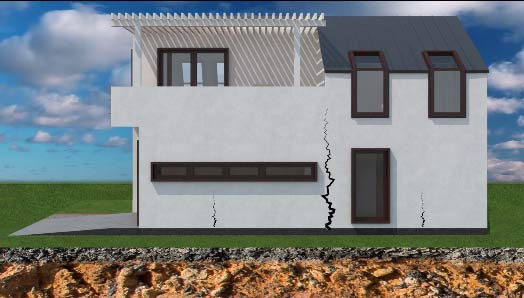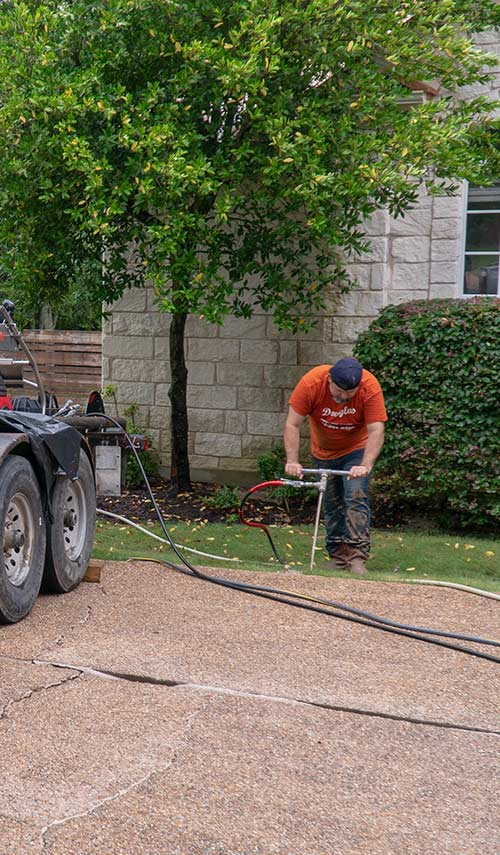512.291.0709
Mon - Fri: 9 AM - 11:30 AM
12:30 PM - 4 PM
October 30, 2020
Many Austin, Texas residential communities and commercial structures are built on shifting and expansive clay soil, a unique type of clay soil that presents several challenges for building foundations. Countless Austin homes have fallen victim to the ebbs and flows of the expansive clay soils that are so prevalent in the area, leading to costly repairs for homeowners. One way to combat the expansion and contraction of expansive clay soils is to have the soil on which your home is built stabilized by a foundation repair professional.
There are many solutions for building on the expansive clay soils here in Austin, though some are labor-intensive, invasive and costly. Soil stabilization, on the other hand, is much easier to implement and can save you thousands. Read on to learn the ins & outs of the soil stabilization process, including why it’s needed, what the process encompasses and the costs that are incurred with such a treatment.

As mentioned above, expansive clay soil is prevalent in Austin. This presents challenges for builders and homeowners because the clay soil is so sensitive to moisture. While normal soil is compressible to a certain point, it eventually settles, but clay tends to swell in the presence of moisture and then contract again when the soil dries. Continuous cycles of expansion and contraction of the soil will cause the home’s foundation to shift, and as masonry isn’t flexible, it eventually cracks.
Over time, shifting soils will cause major problems inside the home and within the home’s structure. Doors can have trouble opening and latching, windows get stuck, floors can slope, and cracks can appear everywhere - the flooring, walls and ceilings. You could end up with leaks, warped walls and even pest infestations.
Some builders try to preempt foundation damage by erecting a very thick concrete foundation, adding rebar to the foundation or replacing the site’s soil with cementitious soil, but for existing construction, the easiest and most effective way to avoid costly problems from shifting and swelling soils is to preventatively treat the soil with a non-toxic chemical compound.
Soil stabilization is an umbrella term that encompasses several methods of changing the properties of soil to meet specific needs. These methods can include chemical, physical, mechanical, biological or a combination of methods to improve soil conditions, including its tensile strength, weight-bearing capacity, moisture retention and more. For our purposes, we’ll focus on chemical soil stabilization for the purpose of regulating moisture retention to prevent foundation problems.
The idea of soil stabilization has been in use for over 5,000 years. Ancient Egyptians, Mesopotamians, Greeks and Romans used various methods for stabilizing soil using lime. While this method is not sufficient for supporting today’s infrastructure, the discovery led to soil stabilization testing in the U.S. as early as 1904. Over the past 100 years, the domestic study of various soil stabilization methods has evolved to include easier, more effective and less costly methods and uses of stabilization, including permanent, non-toxic chemical treatments that can be applied to soils with existing structures upon them.
The Douglas team provides a permanent, environmentally-friendly solution to the cycle of expanding and contracting of the soil your home sits on by way of a non-toxic liquid proven to treat problem soils at the source. Using an 8-foot steel injection wand and up to 600 psi of pressure, our technicians inject an AGSS-ICS ionic stabilizer deep into the soil around your home’s foundation, driveway, walkways, patios, and pools to interrupt the expand/contract cycle and prevent foundation damage. The solution, once injected, reacts with the expansive clay soil to stop it from absorbing moisture. This permanent solution changes the molecular properties of the soil and is proven to mitigate future foundation disruption by up to 88% by greatly increasing the strength and stability of the soil that supports the exterior walls of your home.
The foundation of your home must be supported by strong soil; if the soil base is weak, the interior walls can eventually buckle, crack or warp. Cracks formed in the foundation allow water, mold and pests to enter and cause problems that are costly, both monetarily and in regards to the health of your family.
To avoid major issues, expansive clay soil must be properly stabilized. Doing so allows you to bypass the need to excavate or cause other major disruptions. Other benefits of soil stabilization include:
Douglas Foundation Repair’s advanced soil stabilization treatment for expansive clay soil is an effective, noninvasive solution to your foundation problems. Our soil stabilization treatments typically take less than a day to apply and begin working immediately.
Don’t wait for your foundation to develop an expensive problem. Protect your investment with a preventative AGSS-ICS ionic clay soil stabilizing treatment.
Contact Us